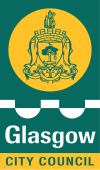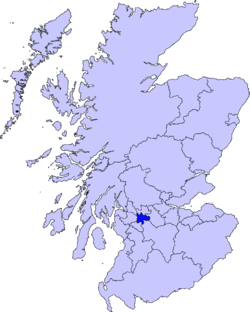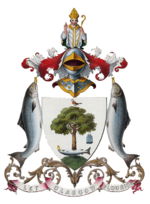- Politics of Glasgow
-
Glasgow City Council
Glesga Ceety Cooncil
Comhairle Cathair GhlaschuLogo
Location Geography Area Ranked 27th - Total 175 km2 (68 sq mi) Admin HQ Glasgow ISO 3166-2 GB-GLG ONS code 00QS Demographics Population Ranked 1st - Total (2005) 592,800 - Density 3,396 / km² Politics Glasgow City Council
http://www.glasgow.gov.uk/Control Labour MPs - Ian Davidson
- Tom Harris
- Margaret Curran
- Willie Bain
- Ann McKechin
- John Robertson
- Anas Sarwar
MSPs Politics in Glasgow, Scotland, is evident in the deliberations and decisions of the city council of Glasgow (Glaschu in Gaelic), in elections to the council, and in elections to the Scottish Parliament (Holyrood) and the House of Commons of the Parliament of the United Kingdom (Westminster).
In the European Parliament, the city area is within the Scotland constituency, which covers all of the 32 council areas of Scotland.
Glasgow City became a unitary council area in 1996, under the Local Government etc. (Scotland) Act 1994,[1] with boundaries somewhat different from those of the City of Glasgow district of the Strathclyde region: a Rutherglen and Fernhill area, a Cambuslang and Halfway area, were transferred from the city area to the new South Lanarkshire council area.
The district had been created in 1975, under the Local Government (Scotland) Act 1973, to include: the former county of city of Glasgow and a number of areas previously within county of Lanark: Cambuslang (Central and North, and South lying outwith East Kilbride), Rutherglen (including the burgh of Rutherglen), part of a Carmunnock area (that lying outwith East Kilbride), and Baillieston, Garrowhill, Mount Vernon and Carmyle, and Springboig areas.
Contents
Glasgow City Council
History
The early city was run by the old Glasgow Town Council. In 1895, the Town Council formally became The Corporation of the City of Glasgow (Glasgow Corporation or City Corporation). It retained this title until local government re-organisation in 1975, when it became City of Glasgow District Council. In 1996 Glasgow District Council was granted unitary status and is now known as Glasgow City Council.
The title Lord Provost of Glasgow, used now for the civic leader of the city council, has history dating from the 15th century.
Glasgow Corporation Transport, was under the control of the Glasgow Corporation, and ran the local buses and Glasgow Trams, until creation of the Strathclyde region in 1975.
During the period of two tier local government, 1975 to 1996, the Glasgow District Council was responsible for refuse collection, museums, libraries and housing, while Strathclyde Regional Council had responsibilities for policing, fire service, water, education, social work and transport.
The city council established in 1996 is a unitary authority with powers and responsibilities previously divided between councils of the Glasgow City district and the Strathclyde region.
The unitary council area borders onto the Renfrewshire council area, the West Dunbartonshire council area, the East Dunbartonshire council area, the North Lanarkshire council, the South Lanarkshire council area and the East Renfrewshire council area.
Council structure
The council is ceremonially headed by the Lord Provost of Glasgow, who is elected to convene the council and perform associated tasks as a general civil leader. The current incumbent is Bob Winter.
The council's executive branch is headed by a Leader of the Council, who is the leader of the largest political grouping, currently the Labour Party.
Elections
Main article: Glasgow City Council election, 2007The council consists of 79 councillors elected for a four-year term from 21 wards. These wards were introduced for the 2007 election and each returns three or four members by the single transferable vote system of election. This system was introduced by the Local Governance (Scotland) Act 2004,[2] as a means of ensuring a reasonably proportionately representative outcome.
The most recent full council election took place on Thursday 3 May 2007. Labour retained overal majority control (45), with increased numbers for Scottish National Party (22), Greens (5), Liberal Democrats (5), one Conservative councillor and one Solidarity councillor returned. No Scottish Socialist Party or independent councillors were returned.
Since 2007 The Solidarity Councillor Ruth Black has since defected to the Labour Party in late 2007 after praising the Leadership of Steven Purcell.[3] While Alex Dingwall and Colin Deens have both defected from the SNP, becoming a Liberal Democrat and Independent respectively.
John Mason, elected in the Baillieston ward as an SNP councillor resigned following election to the House of Commons on 25 July 2008[4] with the SNP winning the resultant by-election in September.[5] However, Mason failed to retain his seat in House of Commons after Margaret Curran, in a landslide victory, won the seat for the Scottish Labour Party in the 2010 General Election. The third council by-election in four months and the second in Ballieston multi-member ward will be precipitated by the death of sitting Labour councillor Douglas Hay.[6] The resulting by-election was won by the Labour candidate, Andy Muir
On the same day of the European Elections 2009, a by-election was held for Ward 14, Anniesland and Drumchapel. The by-election was triggered by the resignation of sitting councillor, Bill Kidd[7](SNP). The resulting by-election was won by Labour candidate, Anne McTaggart.[8]
Current multi-member ward system
A multi-member ward system was introduced for the 2007 council election:
Ward Representation Map 1. Linn (4 members) 2 Lab; 1 SNP; 1 Lib Dem 2. Newlands/Auldburn (3 members) 2 Lab; 1 SNP 3. Greater Pollok (4 members) 3 Lab; 1 SNP 4. Craigton (4 members) 3 Lab; 1 SNP;* 5. Govan (4 members) 3 Lab; 1 SNP 6. Pollokshields (3 members) 1 Lab; 1 SNP; 1 Con 7. Langside (3 members) 1 Lab; 1 SNP; 1 Lib Dem 8. Southside Central (4 members) 2 Lab; 1 IND; 1 Green * 9. Calton (3 members) 2 Lab; 1 SNP 10. Anderston/City (4 members) 2 Lab; 1 SNP; 1 Green 11. Hillhead (4 members) 1 Lab; 1 SNP; 1 Lib Dem; 1 Green 12. Partick West (4 members) 1 Lab; 1 SNP; 1 Lib Dem; 1 Green 13. Garscadden/Scotstounhill (4 members) 3 Lab; 1 SNP 14. Drumchapel/Anniesland (4 members) 4 Labour 15. Maryhill/Kelvin (4 members) 2 Lab; 2 Lib Dem [9] 16. Canal (4 members) 2 Lab; 1 SNP; 1 Green 17. Springburn (3 members) 2 Lab; 1 SNP 18. East Centre (4 members) 3 Lab; 1 SNP 19. Shettleston (4 members) 3 Lab; 1 SNP 20. Baillieston (4 members) 2 Lab; 2 SNP 21. North East (4 members) 3 Lab; 1 SNP Previous single-member ward system
Prior to the 2007 election, there were 79 councillors elected from 79 single-member wards by the plurality (first past the post) system of election. The result from this system was 69 of the 79 councillors representing the Labour Party although that party gained only around half the votes cast in the previous general election to the council, and the Scottish National Party was represented by just four councillors despite gaining some 20% of the votes. There were also three Liberal Democrat councillors, one Conservative councillor, one Scottish Socialist Party councillor and one independent councillor. These old wards has been first used in the general election to the council in 1999:
Ward Ward Ward - Drumry
- Summerhill
- Blairdardie
- Knightswood Park
- Knightswood South
- Yoker
- Anniesland
- Jordanhill
- Kelvindale
- Scotstoun
- Victoria Park
- Hayburn
- Hyndland
- Hillhead
- Partick
- Kelvingrove
- Anderston
- Woodlands
- North Kelvin
- Wyndford
- Maryhill
- Summerston
- Milton
- Ashfield
- Firhill
- Keppochhill
- Merchant City
- Royston
- Cowlairs
- Springburn
- Wallacewell
- Milnbank
- Dennistoun
- Calton
- Bridgeton/ Dalmarnock
- Parkhead
- Carntyne
- Robroyston
- Gartcraig
- Queenslie
- Greenfield
- Barlanark
- Shettleston
- Tollcross Park
- Braidfauld
- Mount Vernon
- Baillieston
- Garrowhill
- Garthamlock
- Easterhouse
- Drumoyne
- Govan
- Ibrox
- Kingston
- Mosspark
- North Cardonald
- Penilee
- Cardonald
- Pollok
- Crookston
- Nitshill
- Darnley
- Carnwadric
- Maxwell Park
- Pollokshields East
- Hutchesontown
- Govanhill
- Strathbungo
- Battlefield
- Langside
- Pollokshaws
- Newlands
- Cathcart
- Mount Florida
- Toryglen
- Kings Park
- Castlemilk
- Carmunnock
- Glenwood
Scottish Parliament
Main article: Glasgow (Scottish Parliament electoral region)The Glasgow electoral region of the Scottish Parliament covers Glasgow City, a Rutherglen area of South Lanarkshire and a small eastern area of Renfrewshire. It includes ten constituencies, each electing one of the parliament's 73 first past the post constituency members. Also, the region elects seven of the parliament's 56 additional members. The system of election is designed to produce a form of proportional representation, and both kinds of member are known as Members of the Scottish Parliament (MSPs).
Until the United Kingdom general election, 2005, the first past the post seats were the same for the Scottish Parliament (Holyrood) as for the United Kingdom Parliament (Westminster) (apart from Orkney and Shetland, which formed separate constituencies at Holyrood, but not Westminster). In 2005 the number of Westminster Members of Parliament (MPs) was cut to 59, with new constituencies being formed, while the existing number of constituencies and MSPs was retained for Holyrood.
First past the post constituencies
The ten Scottish Parliament constituencies in the Glasgow electoral region, and current MSPs, are:-
- Glasgow Anniesland
- Glasgow Cathcart
- Glasgow Southside
- Glasgow Kelvin
- Glasgow Maryhill & Springburn
- Glasgow Pollok
- Glasgow Rutherglen
- Glasgow Shettleston
- Glasgow Springburn
- Bill Kidd
- James Dornan
- Nicola Sturgeon
- Sandra White
- Patricia Ferguson
- Johann Lamont
- James Kelly
- John Mason
- Paul Martin
- Scottish National Party
- Scottish National Party
- Scottish National Party
- Scottish National Party
- Labour Party
- Labour Party
- Labour Party
- Scottish National Party
- Labour Party
Additional members
The current additional member MSPs for the Glasgow electoral region are:
Party Member Labour Party Hanzala Malik Labour Party Drew Smith Labour Party Anne McTaggart Scottish National Party Humza Yousaf Scottish National Party Bob Doris Scottish Green Party Patrick Harvie Conservative Party Ruth Davidson Parliament of the United Kingdom
For elections to the House of Commons of the Parliament of the United Kingdom (Westminster) Glasgow City is now divided between seven constituencies. All seven are entirely within the Glasgow City council area, with boundaries first used in the 2005 general election, and each elects one Member of Parliament (MP) by the plurality (first past the post) system of election.
Prior to the 2005 election, Glasgow City was divided between Westminster constituencies with the same names and boundaries as now existing Holyrood constituencies.
The seven Westminster constituencies created in 2005, and current MPs, are:-
- Anas Sarwar
- Margaret Curran
- Ann McKechin
- Willie Bain
- John Robertson
- Tom Harris
- Ian Davidson
- Labour Party
- Labour Party
- Labour Party
- Labour Party
- Labour Party
- Labour Party
- Labour Co-operative
Footnotes
- ^ See also Local Government etc. (Scotland) Act 1994, Office of Public Sector Information (OPSI) website (OPSI home page)
- ^ See also Local Governance (Scotland) Act 2004, Office of Public Sector Information (OPSI) website
- ^ See [1] [2] [3]
- ^ http://www.eveningtimes.co.uk/news/display.var.2411745.0.mason_calls_time_on_council_career.php
- ^ SNP holds ward after by-election, BBC News, 19 September 2008
- ^ Labour council stalwart Douglas Hay dies aged 76, Gerry Braiden, The Herald, 20 October 2008
- ^ http://www.eveningtimes.co.uk/news/display.var.2504023.0.glasgow_msp_steps_down_from_council.php
- ^ http://www.glasgow.gov.uk/NR/rdonlyres/5611A2A4-AB26-4EFC-ADCE-A0BFD4154D62/0/WARD14DrumchapelAnniesland.pdf
- ^ [4]
Council areas of Scotland Aberdeen · Aberdeenshire · Angus · Argyll and Bute · Clackmannanshire · Dumfries and Galloway · Dundee · East Ayrshire · East Dunbartonshire · East Lothian · East Renfrewshire · Edinburgh · Falkirk · Fife · Glasgow · Highland · Inverclyde · Midlothian · Moray · Na h-Eileanan Siar (Western Isles) · North Ayrshire · North Lanarkshire · Orkney · Perth and Kinross · Renfrewshire · Scottish Borders · Shetland · South Ayrshire · South Lanarkshire · Stirling · West Dunbartonshire · West Lothian
Categories:- Politics of Glasgow
- Glasgow
- Local authorities of Scotland
Wikimedia Foundation. 2010.



